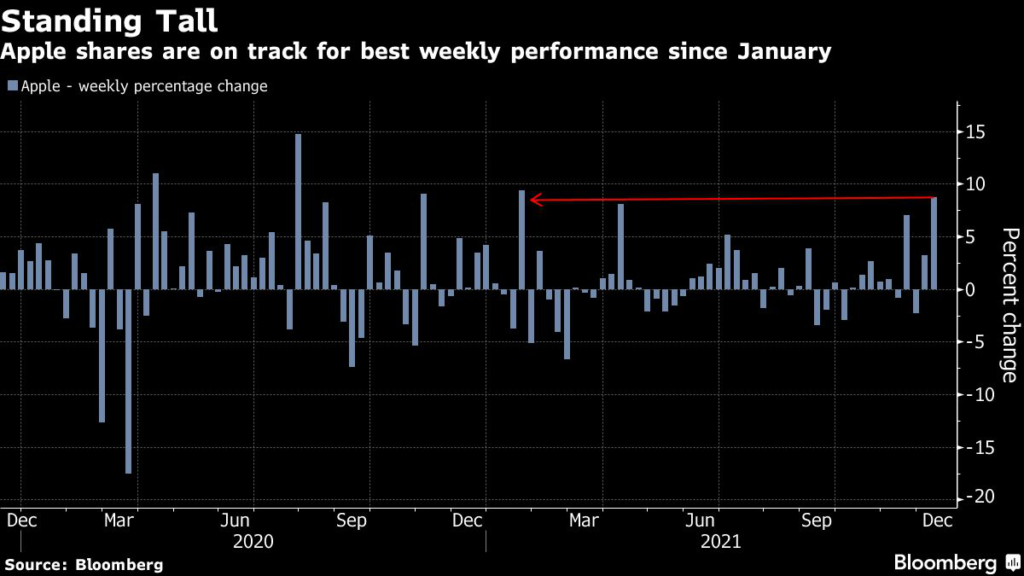(Bloomberg) — On the surface, the Nasdaq Composite Index is having another banner year, up more than 21%. A deeper look shows cracks developing in the bull market that strategists say have been caused by the Federal Reserve’s plan to roll back monetary stimulus.
The index would have gains of only about 3% for 2021 if the 10 biggest companies, including Apple Inc., Microsoft Corp., Amazon.com Inc., Alphabet Inc. and Tesla Inc., were removed, according to Bloomberg calculations.
What’s more, two-thirds of the Nasdaq’s 3,600-plus stocks trade below their average price for the past 200 days, an indicator that signals to chart watchers that the index is in a long-term downtrend. High-growth technology stocks make up more than half of the benchmark.
Those statistics indicate that investors have been fleeing the more speculative technology stocks in favor of bigger and in many cases cheaper shares. Unprofitable companies valued at high multiples of their sales, such as Peloton Interactive, Pinduoduo Inc. and DocuSign Inc., have fallen off a cliff, losing 50% to 70% of their value, while Apple and Alphabet are hovering close to record highs.
Those trillion dollar-plus companies may not be outperformers for long. Michael Hartnett, Bank of America Corp.’s chief market strategist, said in a note to clients Friday that shares of big tech companies could be the next to crack as the Fed gets going on its hawkish path. About two-thirds of Nasdaq’s gains this year have come from just Microsoft, Alphabet, Apple, Tesla and Nvidia Corp., Hartnett said.
Central bank policy makers meet Tuesday and Wednesday next week, and with inflation near a 40-year high, officials have indicated they will discuss speeding up the pace at which they withdraw stimulus. The Fed may reduce its bond buying more quickly than planned, and some officials have said they woud be open to raising interest rates sooner than expected next year.
“If interest rates move up quickly and remain high, that would be very disheartening for the market,” said Tony Minopoli, chief investment officer at Knights of Columbus Asset Advisors. “If we have that kind of a move there’s going to be a real problem.”
Among the biggest companies, Apple has been an investor favorite for the past month, gaining 19% as the Nasdaq slipped 0.4%. Ryan Jacob, a veteran of the dot-com boom-and-bust era who heads Jacob Asset Management, said Apple’s shares are now “likely to struggle,” and he has relatively few megacaps in his fund. “I can’t remember a time when I’ve had so few large-cap names in the top 10 holdings,” he said.
Higher interest rates mean a bigger discount for the present value of future profits, hurting tech stocks with the highest valuations the most.
Tech Chart of the Day
Top Tech Stories
- Chinese AI firm SenseTime is delaying its Hong Kong IPO, according to people familiar with the matter, as tensions with the U.S. government ratcheted higher at the last minute
- Ark Investment Management is “going through soul-searching” as its growth-focused funds fall out of favor amid expectations of tighter Federal Reserve policy, said founder Cathie Wood
- Elon Musk continued selling Tesla shares for a fifth straight week, coming closer to his pledge to offload 10% of his holding
- Oracle shares jump 17% after it reported better-than-expected quarterly revenue, buoyed by strong cloud sales
- Intel CEO Pat Gelsinger will visit Taiwan and Malaysia next week for talks that show how manufacturing in Asia is crucial to his efforts to turn around the fortunes of the chipmaker
(Updates prices throughout, chart)
More stories like this are available on bloomberg.com
©2021 Bloomberg L.P.











